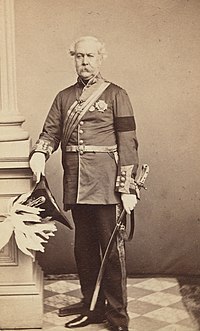Thomas Simson Pratt
| Thomas Simson Pratt | |
|---|---|

Pratt as major-general, c. 1864
|
|
| Born | 1797 |
| Died | 2 February 1879 (aged 81–82) |
| Allegiance | United Kingdom |
| Service/branch | British Army |
| Rank | General |
| Wars |
Napoleonic Wars First Anglo-Chinese War First Taranaki War |
| Awards | KCB |
Sir Thomas Simson Pratt, KCB (1797 – 2 February 1879), was a British Army general. He served in the First Anglo-Chinese War (1839–1841), in India from 1843 to 1855 where he was deputy adjutant-general at Madras, and was Commander of the British Forces in Australia from 1856 to 1861. He was promoted to Lieutenant-General on 31 May 1865, and to full general eight years later.
He was Commander of the British Forces in New Zealand from 1860 to 1861, and was on the Executive Council. He commanded during the First Taranaki War, but as he realised the doubtful validity of the Waitara Purchase (the main cause of the war), he disagreed with Governor Gore Browne, and his military action was ridiculed by the local settlers. He was created KCB for his services in New Zealand by the British Government.
Pratt, born in 1797, was son of Captain James Pratt, by Anne, daughter of William Simson, and was educated at St. Andrews University. He was gazetted to an ensigncy in the 26th (Cameronian) Regiment of Foot on 2 February 1814, and served in Holland in the same year as a volunteer with the 56th (West Essex) Regiment of Foot.
He was present at the attack on Merxem on 2 February and the subsequent bombardment of Antwerp. He purchased his captaincy on 17 September 1825 and was with the 26th foot in the First Anglo-Chinese War. He commanded the land forces in the Second Battle of Chuenpi on 7 January 1841 and at the Battle of the Bogue on 26 February. In the attacks on Canton from 24 May to 1 June, he was in command of his regiment, and was present also at the demonstration before Nanking, and at the signing of the Treaty of Nanking on board HMS Cornwallis. On 28 August 1841, he was gazetted lieutenant-colonel, and from 5 September 1843 to 23 October 1855 was deputy adjutant-general at Madras. He was made a Companion of the Order of the Bath (CB) on 14 October 1841.
...
Wikipedia
